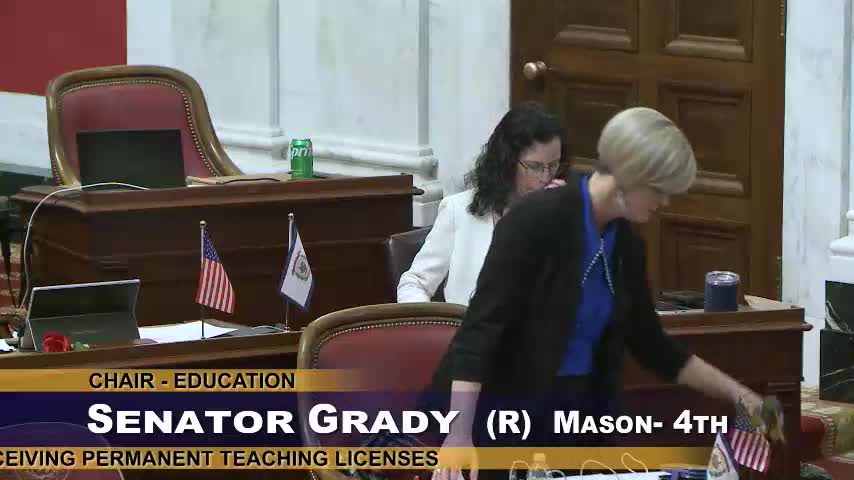Senate passes bill easing certification for experienced teachers and promotes microgrid districts
April 12, 2025 | 2025 Legislature WV, West Virginia
This article was created by AI summarizing key points discussed. AI makes mistakes, so for full details and context, please refer to the video of the full meeting. Please report any errors so we can fix them. Report an error »

In the heart of the West Virginia Senate chamber, a pivotal session unfolded on April 12, 2025, as lawmakers engaged in discussions that could reshape educational and energy policies in the state. The atmosphere was charged with anticipation as senators deliberated on two significant bills that promise to impact teachers and the development of microgrid districts.
The first major topic of discussion centered around a bill aimed at streamlining the certification process for teachers. Senator from Mason introduced an amendment that allows educators with a bachelor's degree and a decade of teaching experience to apply for a permanent teaching certificate without the need for additional coursework. This initiative, which also incorporates the "troops to teachers" program, received overwhelming support, passing with 31 votes in favor and none against. The bill's swift approval reflects a growing recognition of the need to retain experienced educators in West Virginia's classrooms.
As the session progressed, attention shifted to the energy sector, specifically the proposed microgrid program designed to attract high-impact data centers to the state. Senator from Lewis advocated for the Senate to concur with amendments made by the House, emphasizing the potential economic benefits of developing microgrid districts. However, not all senators were convinced. Senator from Logan raised concerns about the implications for utility rates, particularly for low-income residents. He highlighted the risk of cost shifting, where wealthier customers who install microgrids might reduce their contributions to the grid, potentially leading to higher rates for those who remain reliant on traditional energy sources.
The debate underscored a critical tension between innovation and equity, as lawmakers grappled with the potential benefits of modernizing energy infrastructure against the backdrop of protecting vulnerable communities. Senator Logan's passionate plea for his constituents resonated in the chamber, reminding his colleagues of the real-world impacts of their decisions.
As the session concluded, the Senate's actions on these bills signal a commitment to both educational advancement and energy innovation, albeit with a cautious eye on the potential consequences for all West Virginians. The discussions from this meeting will likely echo in the lives of many, shaping the future of education and energy in the state.
The first major topic of discussion centered around a bill aimed at streamlining the certification process for teachers. Senator from Mason introduced an amendment that allows educators with a bachelor's degree and a decade of teaching experience to apply for a permanent teaching certificate without the need for additional coursework. This initiative, which also incorporates the "troops to teachers" program, received overwhelming support, passing with 31 votes in favor and none against. The bill's swift approval reflects a growing recognition of the need to retain experienced educators in West Virginia's classrooms.
As the session progressed, attention shifted to the energy sector, specifically the proposed microgrid program designed to attract high-impact data centers to the state. Senator from Lewis advocated for the Senate to concur with amendments made by the House, emphasizing the potential economic benefits of developing microgrid districts. However, not all senators were convinced. Senator from Logan raised concerns about the implications for utility rates, particularly for low-income residents. He highlighted the risk of cost shifting, where wealthier customers who install microgrids might reduce their contributions to the grid, potentially leading to higher rates for those who remain reliant on traditional energy sources.
The debate underscored a critical tension between innovation and equity, as lawmakers grappled with the potential benefits of modernizing energy infrastructure against the backdrop of protecting vulnerable communities. Senator Logan's passionate plea for his constituents resonated in the chamber, reminding his colleagues of the real-world impacts of their decisions.
As the session concluded, the Senate's actions on these bills signal a commitment to both educational advancement and energy innovation, albeit with a cautious eye on the potential consequences for all West Virginians. The discussions from this meeting will likely echo in the lives of many, shaping the future of education and energy in the state.
View full meeting
This article is based on a recent meeting—watch the full video and explore the complete transcript for deeper insights into the discussion.
View full meeting